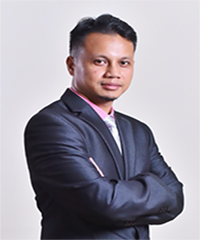Invited Speaker in AEMST 2025

Assoc. Prof. Mohd Zamir Pakhuruddin
Universiti Sains Malaysia, Malaysia
Speech Title: Advanced Materials for High-Efficiency and Emerging Photovoltaic Devices
Bio: Associate Professor Ts. Dr. Mohd Zamir Pakhuruddin is currently the Director at the Institute of Nano Optoelectronics Research and Technology (INOR) and a lecturer at School of Physics, Universiti Sains Malaysia (USM). He graduated with BEng of Electrical Engineering from University of Sheffield, United Kingdom. He spent about 8 years in industry as a Senior Engineer of Photolithography and Sputtering (R&D) in SilTerra and Fuji Electric, Kulim Hi-Tech Park respectively. In 2012, he graduated with MSc of Physics at Universiti Sains Malaysia (USM), where he did his research on silicon thin-film solar cells on flexible substrates. In 2016, he obtained his PhD in Photovoltaic Engineering from University of New South Wales (UNSW), Australia, where he worked on the development of light-trapping schemes in e-beam evaporated laser-crystallised silicon thin-film solar cells on glass superstrates. His expertise is in photovoltaic materials and devices (PVMD). His current research includes black silicon, perovskite, organic, III-nitrides and other thin-film solar cells for conventional, solar windows and indoor photovoltaic applications. Besides, he also works on anti-reflective coatings for optoelectronic devices. He also has ongoing works on simulation of solar cells using ray tracing and other device simulation platforms. To date, he has published more than 50 research papers in the field of photovoltaic and he is also active in reviewing manuscripts for high-impact journals such as IEEE Journal of Photovoltaics, Solar Energy, Applied Surface Science, Nanoscale, ACS Applied Energy Materials, Results in Physics, Energies and others. He has been a keynote speaker and an invited speaker in international conferences, seminars and trainings on topics related to the physics of solar cells, optics and light-trapping, photovoltaic technologies and photovoltaic manufacturing. He is a Professional Technologist (Ts.) in the area of Green Technology, awarded by Malaysia Board of Technologists (MBOT). Besides, he is a TTT-certified trainer (Human Resource Development Corporation’s Train-the-Trainer Certification Program). To date, he has successfully conducted five training sessions to more than 210 managers and engineers of First Solar Malaysia Sdn. Bhd. (Kulim Hi-Tech Park), Maxeon Solar Technologies/SunPower Malaysia (Alor Gajah, Melaka) and Hanwha Q Cells (Cyberjaya, Selangor), in 2023 and 2024, under HRD Corp SBL–Khas Scheme.
